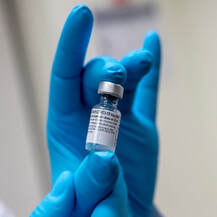This year, scientific news was consumed in a more mainstream fashion than ever before. COVID-19 brought conversations about medical science, scientific process, vaccines, and other complex information the average news consumer was previously unaware of – or did not necessarily need to care about – into the public sphere of awareness. Communicating scientific developments instantly became an instrumental element for progress and safety for every person in society to understand how to deal with the pandemic and how to make it through. The importance of clear science communications and the flaws in accurately communicating these developments to varying audiences were cast in a bright spotlight.

Science Talk’s Dr. Allison Coffin and Dr. Kiki Sanford sat down with Jessica McNellis from s2s Public Relations and Communications to discuss how this past year has impacted science communications and how it will change in a post-pandemic world. This is the first Science Talk Q&A in the two-minute read series.
Question 1: How has COVID-19 impacted science communications over the past year?
Dr. Allison Coffin: Science impacts all of us whether we think about it or not. If you take cholesterol medication or know someone who has undergone chemotherapy, you are impacted by science. The pandemic is a rare occurrence where we are all able to universally pinpoint how science impacts each of our lives. An interesting shift we have seen over the past year, according to several recent surveys, is increased trust in science, particularly medical science, in the United States. It is still not where we as scientists and science communicators would like those trust levels to be, but seeing that growth in trust, broadly speaking, over one year offers a lot of opportunity for progress in the scientific community.
the reason we don’t see people in the U.S. getting polio anymore is because the vaccine works, really well
Dr. Kiki Sanford: The importance of communicating the science has become clearer than ever to scientists. There have always been pockets of the scientific community who put a high value on science communications, but scientific institutions have not historically prioritized communicating science stories to broader audiences. Over the last year, we have seen more and more scientists engaging on social media, writing blogs and opinion pieces for mainstream media, and proactively putting themselves out there to share their knowledge and expertise. This year has led to not only the increased public trust in science, but an increase in the prevalence of science communications by scientists themselves. You can’t help but wonder if the two are related.
Question 2: Is the average news consumer more familiar with scientific jargon now than they were pre-pandemic? How does that change how we produce scientific news?
AC: Familiarity versus understanding are two very different things. The average news consumer has likely been familiar with some of the more popular terminology, like vaccine, before the pandemic. However, terminology like spike protein, mRNA, aerosol, and other medical jargon specific to epidemiologists and others who study viruses has become more familiarized in mainstream conversations. Whether or not the average news consumer understands those terms and how they apply to COVID infection and vaccine development are very different questions. There is definitely a greater familiarity with a wider set of scientific vocabulary, but not always a greater understanding.

KS: The varying degrees of understanding also stems from the fact that each person is getting their information from different sources, which heightens the risk of misinterpretation of information. If you are reading an article by Apoorva Mandavilli on The New York Times, who does an amazing job talking with a wide range of expert sources, clarifying terms and really breaking everything down in her articles, your risk of misinterpretation is going to be lower than if you are referencing a 280-character tweet without further context of the information being shared.
AC: When it comes to how we should change how scientific news is distributed, there is only so much that can be done with respect to regulating how information spreads on social platforms or combatting how news outlets choose to interpret and share information to match personal or political bias. One distribution method we as scientists do have control over is recognizing our role and influence within our trusted personal relationships and inner circles. Taking the opportunity to share advice and communicate scientific developments in digestible ways to those in our trusted networks can go a long way, even if it doesn’t seem to have the same impact as a national platform. We also need to create champions to counter misinformation or disinformation in very public ways. There is certainly a balance to strike there when putting forward cultural icons and celebrities who people look up to and trust, and who have these massive fan bases to influence people.
One challenge that does not have a simple solution lies in the storytelling of science. There are success stories that sell and success stories that don’t. A story a few years from now about a crowd of people walking out of an event and two weeks later no one comes down with COVID, that is a story of vaccine success. But that’s a harder one-off story to sell and one that likely would not get published. To share an example stepping outside of COVID, we don’t regularly read stories about polio vaccine success, which leads people who are questioning whether they want to receive or give their children the polio vaccine to say: “We don’t see people in the U.S. getting polio anymore, so we don’t need polio vaccinations,” without recognizing the reason we don’t see people in the U.S. getting polio anymore is because the vaccine works, really well. There is a huge challenge telling scientific success stories, in large part because success in science can look a lot like the status quo.



Leave a Reply